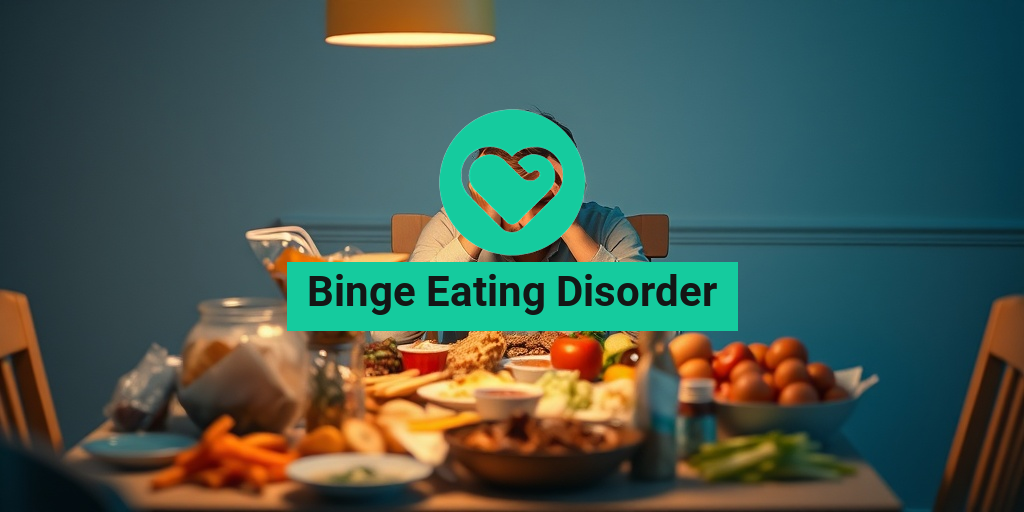What Is Binge Eating Disorder?
Binge Eating Disorder (BED) is a serious mental health condition characterized by recurrent episodes of eating large quantities of food, often to the point of discomfort. Unlike bulimia nervosa, individuals with BED do not engage in compensatory behaviors such as vomiting or excessive exercise. This disorder can lead to significant emotional distress and physical health issues, making it crucial to understand its implications.
According to the DSM-5 (Diagnostic and Statistical Manual of Mental Disorders, Fifth Edition), BED is classified as a distinct eating disorder. It affects people of all ages, genders, and backgrounds, and its prevalence is increasing. Understanding BED is essential for recognizing its symptoms and seeking appropriate treatment.
Causes of Binge Eating Disorder
The exact causes of Binge Eating Disorder are complex and multifaceted. They often include:
- Genetic Factors: A family history of eating disorders or mental health issues can increase the risk.
- Psychological Factors: Conditions such as depression, anxiety, or low self-esteem often co-occur with BED.
- Environmental Influences: Stressful life events, trauma, or societal pressures regarding body image can trigger binge eating episodes.
Understanding these causes can help individuals and healthcare providers develop effective treatment plans tailored to their needs.
Binge Eating Symptoms
Recognizing the symptoms of Binge Eating Disorder is vital for early intervention and treatment. Common symptoms include:
- Frequent Binge Eating Episodes: Consuming unusually large amounts of food in a short period, often feeling a loss of control during these episodes.
- Emotional Distress: Feelings of shame, guilt, or disgust after binge eating, which can lead to a cycle of emotional eating.
- Physical Discomfort: Experiencing physical pain or discomfort due to overeating.
- Eating in Secret: Hiding food or eating alone to avoid judgment from others.
- Changes in Weight: Significant weight gain or fluctuations, which can lead to further emotional distress.
How to Identify Binge Eating Disorder
If you or someone you know is experiencing these symptoms, it may be time to consider a binge eating disorder test. This can involve a comprehensive evaluation by a mental health professional who specializes in eating disorders. They will assess your eating patterns, emotional health, and any underlying psychological issues.
It’s important to remember that seeking help is a sign of strength. Resources like Yesil Health AI (yesilhealth.com) can provide evidence-based information and support for those struggling with BED.
When to Seek Help
If binge eating is affecting your quality of life, it’s crucial to reach out for help. Early intervention can lead to better outcomes and a healthier relationship with food. Treatment options may include:
- Therapy: Cognitive-behavioral therapy (CBT) is often effective in treating BED.
- Medication: Certain medications may help reduce binge eating episodes and manage associated symptoms.
- Support Groups: Connecting with others who understand your struggles can provide emotional support and encouragement.
In conclusion, Binge Eating Disorder is a serious condition that requires understanding and compassion. By recognizing the symptoms and seeking appropriate treatment, individuals can reclaim their health and well-being. Remember, you are not alone in this journey, and help is available. 🌟

Causes of Binge Eating Disorder
Binge Eating Disorder (BED) is a complex condition that can stem from a variety of factors. Understanding these causes is crucial for effective treatment and recovery. Here are some of the primary causes associated with BED:
Genetic Factors
Research suggests that genetics can play a significant role in the development of binge eating disorder. Individuals with a family history of eating disorders may be more susceptible to BED. Genetic predispositions can influence how the brain regulates hunger and satiety, potentially leading to disordered eating behaviors.
Psychological Factors
Many individuals with binge eating disorder struggle with underlying psychological issues. Common psychological factors include:
- Depression: Feelings of sadness and hopelessness can lead to emotional eating as a coping mechanism.
- Anxiety: High levels of anxiety can trigger binge eating episodes as a way to manage stress.
- Low Self-Esteem: Negative body image and low self-worth can contribute to unhealthy eating patterns.
Environmental Influences
The environment in which a person lives can also contribute to the development of binge eating disorder. Factors such as:
- Childhood Trauma: Experiences of abuse or neglect during childhood can lead to emotional eating in adulthood.
- Societal Pressure: Media portrayals of ideal body types can create unrealistic standards, leading to disordered eating behaviors.
- Availability of Food: Easy access to high-calorie, low-nutrient foods can trigger binge eating episodes.
Biological Factors
Biological factors, including hormonal imbalances and brain chemistry, can also contribute to binge eating disorder. For instance, disruptions in the hormones that regulate hunger and fullness, such as leptin and ghrelin, can lead to increased appetite and cravings for unhealthy foods.
Risk Factors for Binge Eating
Identifying the risk factors associated with binge eating disorder can help in early intervention and prevention. Here are some key risk factors to consider:
Age and Gender
Binge eating disorder can affect individuals of all ages, but it is most commonly diagnosed in adolescents and young adults. Additionally, while BED can occur in both men and women, studies indicate that women are more likely to seek treatment for this disorder.
Dieting and Restrictive Eating
Engaging in restrictive dieting or frequent weight cycling can increase the risk of developing binge eating disorder. When individuals severely limit their food intake, it can lead to intense cravings and eventual binge episodes as the body seeks to compensate for the deprivation.
Emotional and Psychological Stressors
Individuals who experience high levels of emotional stress, such as those dealing with significant life changes, relationship issues, or work-related pressures, may be at a higher risk for BED. Emotional eating often serves as a temporary escape from these stressors.
History of Eating Disorders
Those with a history of other eating disorders, such as anorexia nervosa or bulimia nervosa, are at an increased risk of developing binge eating disorder. The transition from one eating disorder to another is not uncommon, as individuals may struggle with various forms of disordered eating throughout their lives.
Social and Cultural Influences
Social factors, including peer pressure and cultural attitudes towards body image, can significantly impact the likelihood of developing binge eating disorder. In cultures that emphasize thinness and beauty, individuals may feel compelled to engage in unhealthy eating behaviors to conform to societal expectations.
Understanding the causes and risk factors associated with binge eating disorder is essential for effective treatment and support. If you or someone you know is struggling with BED, seeking professional help can be a vital step towards recovery. 🌟

Diagnosis of Binge Eating Disorder
Binge Eating Disorder (BED) is a serious mental health condition characterized by recurrent episodes of eating large quantities of food, often quickly and to the point of discomfort. Understanding how this disorder is diagnosed is crucial for those who may be struggling with it or know someone who is. The diagnosis typically involves a comprehensive evaluation by a healthcare professional, including a detailed medical history and psychological assessment.
Criteria for Diagnosis
The Diagnostic and Statistical Manual of Mental Disorders, Fifth Edition (DSM-5) outlines specific criteria for diagnosing Binge Eating Disorder. To be diagnosed, an individual must experience the following:
- Recurrent episodes of binge eating: This involves consuming an unusually large amount of food in a discrete period, typically within two hours.
- Loss of control: During these episodes, individuals often feel a lack of control over their eating behavior.
- Associated distress: The binge eating episodes lead to significant distress, including feelings of shame or guilt.
- Frequency: Binge eating occurs at least once a week for three months.
- Absence of compensatory behaviors: Unlike bulimia nervosa, individuals with BED do not regularly engage in behaviors such as purging or excessive exercise.
Assessment Tools
Healthcare providers may use various tools to assess and diagnose Binge Eating Disorder. One common method is the Binge Eating Disorder Test (BEDT), which consists of a series of questions designed to evaluate eating behaviors and emotional responses related to food. Additionally, a thorough psychological evaluation may be conducted to rule out other mental health disorders.
Importance of Professional Help
If you or someone you know is exhibiting signs of Binge Eating Disorder, seeking professional help is essential. A qualified mental health professional can provide a proper diagnosis and help develop a tailored treatment plan. Early intervention can significantly improve outcomes and lead to a healthier relationship with food. 🌟
Treatment Options for Binge Eating
Treating Binge Eating Disorder is a multifaceted process that often requires a combination of therapies and support systems. The goal of treatment is not only to reduce binge eating episodes but also to address the underlying emotional and psychological issues that contribute to the disorder.
Psychotherapy
One of the most effective treatments for Binge Eating Disorder is psychotherapy. Various therapeutic approaches can be beneficial, including:
- Cognitive Behavioral Therapy (CBT): This is a structured program that helps individuals identify and change negative thought patterns and behaviors related to eating.
- Interpersonal Therapy (IPT): This therapy focuses on improving interpersonal relationships and social functioning, which can help reduce binge eating episodes.
- Dialectical Behavior Therapy (DBT): DBT is particularly effective for those who struggle with emotional regulation and self-destructive behaviors.
Medication
In some cases, medication may be prescribed to help manage Binge Eating Disorder. Certain medications, such as selective serotonin reuptake inhibitors (SSRIs), have shown promise in reducing binge eating episodes and improving mood. It’s essential to consult with a healthcare provider to determine the best medication and dosage for individual needs. 💊
Support Groups
Joining a support group can provide individuals with a sense of community and understanding. Sharing experiences with others who are facing similar challenges can be incredibly therapeutic. Many organizations offer resources and support for those dealing with Binge Eating Disorder, including online forums and local meet-ups.
Nutrition Counseling
Working with a registered dietitian can help individuals develop a healthier relationship with food. Nutrition counseling focuses on creating balanced meal plans, understanding hunger cues, and addressing emotional eating triggers. This holistic approach can be a vital part of recovery. 🥗
In conclusion, diagnosing and treating Binge Eating Disorder involves a comprehensive approach that includes psychological support, medication, and nutritional guidance. If you or someone you know is struggling, remember that help is available, and recovery is possible. 🌈

Managing Binge Eating at Home
Binge Eating Disorder (BED) is a complex condition that can significantly impact an individual’s physical and emotional well-being. However, managing binge eating at home is possible with the right strategies and support. Here are some effective methods to help you regain control over your eating habits.
Understanding Your Triggers
One of the first steps in managing binge eating is to identify your triggers. These can be emotional, environmental, or situational. Common triggers include:
- Stress and Anxiety: Many individuals turn to food as a coping mechanism during stressful times.
- Social Situations: Events involving food can lead to overeating, especially if you feel pressured to eat.
- Boredom: Eating out of boredom can lead to binge episodes, as it becomes a way to fill time.
Keeping a journal to track your eating habits and emotions can help you pinpoint these triggers. Once you understand what prompts your binge eating, you can develop strategies to address them.
Establishing a Routine
Creating a structured eating routine can help regulate your hunger and reduce the likelihood of binge eating. Here are some tips to establish a healthy routine:
- Regular Meal Times: Aim to eat at the same times each day to help your body develop a natural rhythm.
- Balanced Meals: Include a mix of proteins, healthy fats, and carbohydrates to keep you satisfied and energized.
- Mindful Eating: Focus on your food while eating—this means no distractions like TV or smartphones. Pay attention to your hunger cues and stop eating when you feel full.
Healthy Coping Mechanisms
Instead of turning to food during emotional distress, consider healthier coping mechanisms. Here are some alternatives:
- Physical Activity: Exercise can boost your mood and reduce stress. Even a short walk can make a difference!
- Creative Outlets: Engage in activities like painting, writing, or playing music to express your emotions.
- Relaxation Techniques: Practices such as yoga, meditation, or deep breathing can help manage stress and anxiety.
Seeking Support
Don’t hesitate to reach out for support. Whether it’s friends, family, or a support group, sharing your experiences can provide comfort and accountability. Online communities, such as those found on Reddit, can also offer valuable insights and encouragement from others facing similar challenges.
Long-Term Outlook for Binge Eating Disorder
The long-term outlook for individuals with Binge Eating Disorder can vary widely, but with appropriate treatment and support, many people can achieve significant improvements in their symptoms and overall quality of life.
Understanding the Recovery Process
Recovery from BED is often a gradual process that involves several stages:
- Awareness: Recognizing that you have a problem is the first step toward recovery.
- Seeking Help: Professional treatment options, such as therapy or medication, can be crucial in managing BED.
- Developing Skills: Learning coping strategies and healthier eating habits is essential for long-term success.
Potential Treatment Options
There are various treatment options available for Binge Eating Disorder, including:
- Cognitive Behavioral Therapy (CBT): This is one of the most effective therapies for BED, helping individuals change negative thought patterns related to food and body image.
- Medication: Certain medications, such as antidepressants or anti-seizure drugs, may be prescribed to help manage symptoms.
- Support Groups: Joining a support group can provide a sense of community and shared experiences, which can be incredibly beneficial.
Long-Term Management Strategies
To maintain progress and prevent relapse, consider the following long-term management strategies:
- Regular Check-Ins: Schedule regular appointments with a therapist or counselor to monitor your progress.
- Continued Education: Stay informed about BED and healthy eating practices to reinforce your commitment to recovery.
- Self-Compassion: Be kind to yourself throughout the recovery process. Understand that setbacks may occur, but they do not define your journey.
In conclusion, while the journey to manage Binge Eating Disorder can be challenging, it is entirely possible with the right tools and support. Remember, you are not alone, and help is available! 🌟

Frequently Asked Questions about Binge Eating Disorder
What is Binge Eating Disorder?
Binge Eating Disorder (BED) is a serious eating disorder characterized by recurrent episodes of eating large quantities of food, often quickly and to the point of discomfort. Unlike bulimia, individuals with BED do not regularly engage in compensatory behaviors such as purging.
What are the symptoms of Binge Eating Disorder?
- Frequent episodes of eating large amounts of food
- Feeling a loss of control during binge eating
- Experiencing distress or shame about eating habits
- Eating rapidly or until uncomfortably full
- Eating alone due to embarrassment
How is Binge Eating Disorder diagnosed?
The diagnosis of Binge Eating Disorder is typically made by a healthcare professional based on criteria outlined in the DSM-5. This includes the frequency of binge eating episodes and the associated feelings of distress.
What treatments are available for Binge Eating Disorder?
Treatment options for Binge Eating Disorder may include:
- Cognitive Behavioral Therapy (CBT)
- Medications such as antidepressants or anti-seizure medications
- Nutrition counseling to develop healthier eating habits
- Support groups for shared experiences and encouragement
Is there a specific test for Binge Eating Disorder?
While there is no single test for Binge Eating Disorder, healthcare providers may use questionnaires and interviews to assess eating patterns and emotional health. A thorough evaluation can help determine the presence of BED.
What are the causes of Binge Eating Disorder?
The causes of Binge Eating Disorder are complex and can include:
- Genetic factors
- Psychological issues such as anxiety or depression
- Environmental influences like trauma or stress
- Dieting behaviors that lead to binge eating
How does Binge Eating Disorder differ from Bulimia?
While both disorders involve episodes of binge eating, the key difference is that individuals with Bulimia Nervosa engage in compensatory behaviors, such as vomiting or excessive exercise, to prevent weight gain. In contrast, those with Binge Eating Disorder do not regularly use these behaviors.
Can Binge Eating Disorder be treated effectively?
Yes, Binge Eating Disorder can be treated effectively with a combination of therapy, medication, and support. Many individuals experience significant improvement in their symptoms and overall quality of life with appropriate treatment.
Where can I find support for Binge Eating Disorder?
Support for Binge Eating Disorder can be found through:
- Therapists specializing in eating disorders
- Support groups both in-person and online
- Hotlines for immediate assistance
Are there any medications for Binge Eating Disorder?
Yes, certain medications, such as selective serotonin reuptake inhibitors (SSRIs) and other medications, have been found to help reduce binge eating episodes and improve mood. It’s essential to consult a healthcare provider for personalized recommendations.
How can I help someone with Binge Eating Disorder?
If you know someone struggling with Binge Eating Disorder, you can help by:
- Listening without judgment
- Encouraging them to seek professional help
- Being supportive and patient throughout their recovery journey
For more information and resources, consider reaching out to healthcare professionals or organizations specializing in eating disorders. Remember, recovery is possible! 🌟




